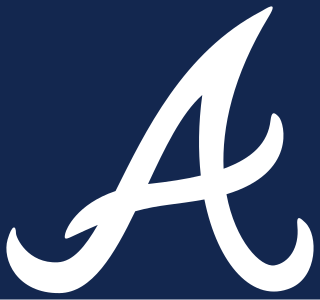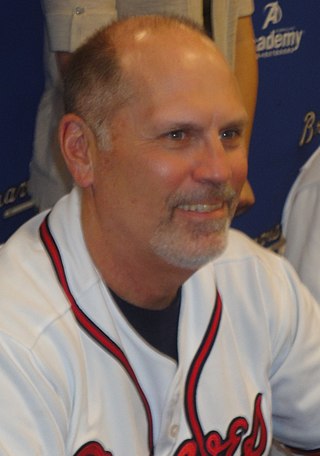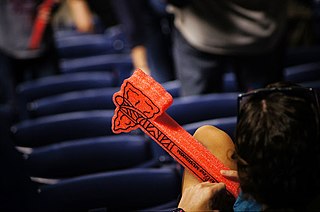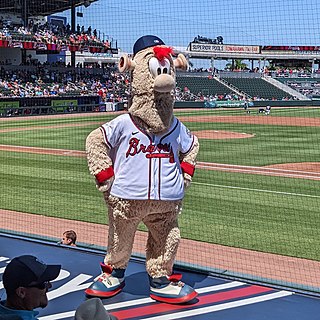
The Atlanta Braves are an American professional baseball team based in the Atlanta metropolitan area. The Braves compete in Major League Baseball (MLB) as a member club of the National League (NL) East division. The Braves were founded in Boston, Massachusetts, in 1871, as the Boston Red Stockings. The club was known by various names until the franchise settled on the Boston Braves in 1912. The Braves are the oldest continuously operating professional sports franchise in America.

Turner Field was a baseball stadium located in Atlanta, Georgia. From 1997 to 2016, it served as the home ballpark to the Atlanta Braves of Major League Baseball (MLB). Originally built as Centennial Olympic Stadium in 1996 to serve as the centerpiece of the 1996 Summer Olympics, it was converted into a baseball stadium to serve as the new home of the team. The Braves moved less than one block from Atlanta–Fulton County Stadium, which served as their home field for 31 seasons from 1966 to 1996.
Chief Moccanooga was the former athletic mascot for the University of Tennessee at Chattanooga, until 1996, when the university abandoned the mascot as potentially offensive at the request of the Chattanooga InterTribal Association. Chief Moccanooga was replaced with a mockingbird, the state bird of Tennessee, and the nickname for Chattanooga athletics was changed from 'Moccasins' to simply 'Mocs'.

Chief Noc-A-Homa was a mascot for the American professional baseball team Atlanta Braves from 1966 to 1985. He was primarily played by Levi Walker, Jr. After being a mascot for the franchise for two decades, the Atlanta Braves retired Chief Noc-A-Homa before the 1986 season.

Brian Gerald Snitker is an American professional baseball coach and former player who is the manager of the Atlanta Braves of Major League Baseball (MLB). Snitker has been in the Braves organization in different roles since playing in their minor league organization from 1977 to 1980. He became their manager in 2016. In 2021, Snitker led the Braves to a World Series championship.

Chief Wahoo is a logo that was used by the Cleveland Indians, a Major League Baseball (MLB) franchise based in Cleveland, Ohio, from 1951 to 2018.

Since the 1960s, the issue of Native American and First Nations names and images being used by sports teams as mascots has been the subject of increasing public controversy in the United States and Canada. This has been a period of rising Indigenous civil rights movements, and Native Americans and their supporters object to the use of images and names in a manner and context they consider derogatory. They have conducted numerous protests and tried to educate the public on this issue.
This article details the history of the Atlanta Braves, which concerns the evolution of the Major League Baseball team Atlanta Braves over time.

Frederick Charles Freeman is an American and Canadian professional baseball first baseman for the Los Angeles Dodgers of Major League Baseball (MLB). Previously, Freeman played for the Atlanta Braves for 12 seasons, making his MLB debut with the team in 2010. In his final season with Atlanta, Freeman won the 2021 World Series over the Houston Astros.

The Washington Redskins name controversy involved the name and logo previously used by the Washington Commanders, a National Football League (NFL) franchise located in the Washington metropolitan area. In the 1960s, the team's longtime name—the Redskins—and the associated logo began to draw criticism from Native American groups and individuals. The topic, part of the larger Native American mascot controversy, began receiving widespread public attention in the 1990s. In 2020, the team responded to economic pressure in the wake of widespread recognition of systemic racism by retiring the name and logo. The team called itself the "Washington Football Team" before rebranding as the Commanders in 2022.
Sports teams named Redskins are part of the larger controversy regarding the use of Native American names, images and symbols by non-native sports teams. Teams of this name have received particular public attention because the term redskin is now generally regarded as disparaging and offensive.
In 2005 the National Collegiate Athletic Association (NCAA) distributed a "self evaluation" to its member institutions for teams to examine the use of potentially offensive imagery with their mascot choice. This examination was done in accordance with NCAA policy that requires each member institution to maintain an "atmosphere of respect for and sensitivity to the dignity of every person." Fourteen schools either removed all references to Native American culture or were deemed not to have references to Native American culture as part of their athletics programs. Subsequently, 19 teams were cited as having potentially "hostile or abusive" names, mascots, or images, that would be banned from displaying them during post-season play, and prohibited from hosting tournaments.

The Cleveland Indians name and logo controversy referred to the controversy surrounding the club name and logo previously used by Major League Baseball's Cleveland Guardians, an American professional baseball team based in Cleveland, Ohio.

The tomahawk chop is a sports celebration most popularly used by fans of the American Florida State Seminoles, Atlanta Braves baseball team, the Kansas City Chiefs American football team, and the English Exeter Chiefs rugby union team. The tomahawk chop involves moving the forearm forwards and backwards repeatedly with an open palm to simulate a tomahawk chopping, and is often accompanied by a distinctive cheer. The Atlanta Braves also developed a foam tomahawk to complement the fan actions.

The Chicago Blackhawks name and logo controversy refers to the controversy surrounding the name and logo of the Chicago Blackhawks, a National Hockey League (NHL) ice hockey team based in Chicago, Illinois. The use of terms and images referring to Native Americans/First Nations as the name or mascot for a sports team without permissions from or consultations with local Indigenous communities, is a topic of public controversy in the United States and Canada. Since the 1960s, as part of the indigenous civil rights movements, there have been a number of protests and other actions by Native Americans and their supporters targeting the more prominent use of such names and images by professional franchises such as the Cleveland Guardians formerly known as the "Indians" of Major League Baseball (MLB) that was officially discontinued in 2016; the Washington Commanders formerly known as the "Redskins" of the National Football League (NFL), the NFL's Kansas City Chiefs and MLB's Atlanta Braves, the latter two attracting criticism of "the tomahawk chop" often performed by their fans. Like other teams with tribal mascots, there are calls from Indigenous activists and organizations to change the Blackhawks' name and logo and eliminate tribal mascots and imagery throughout sports. In contrast to generic names used by other teams, Blackhawks refers to a World War I-era U.S. Army division which was named for prominent Illinois-based Native American chief Black Hawk.
The Kansas City Chiefs is one of the professional sports teams involved in the controversy regarding the use of Native American names and imagery, but received less attention than other teams until 2013 when fan behavior at games, including stereotypical headdresses, face paint, performing a "war chant" and tomahawk chop became more publicly known. Protests by change advocates intensified following the name changes of the Washington Commanders and Cleveland Guardians. In addition, the Chiefs have been highly visible due to their participation in the Super Bowl in 2019, 2020, and 2022. Native American groups once again demonstrated outside the stadium hosting Super Bowl LVII.

Blooper is the official mascot for the Atlanta Braves Major League Baseball team. A big, fuzzy creature with extendable ears, he performs various routines to entertain fans during baseball games at Truist Park, and makes public relation and goodwill appearances for the Braves. While some fans were reluctant when Blooper was introduced, his antics on and off the field soon won fans over in Atlanta.













